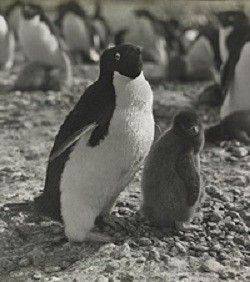100-Year-Old Study on Penguins' Sexual Life Published

A hundred-year-old study about the sexual life of Adélie penguins has finally been published.
Officials from the National History Museum have discovered an old article about the sexual life of the penguins. They claim that the article was withheld at that time because officials who studied or analysed it felt it was quite was explicit.
Officials found the astonishing article in the bird collections at the Natural History Museum at Tring. They felt the article would give a major insight into the penguins' lives.
In 1911, Dr George Levick, who was a surgeon and the medical officer, went on a scientific expedition to study the behaivour of the penguins at Cape Adare, which has the largest Adélie penguin colony in the world.
During his expedition he recorded a lot of details, even the arrival of the very first penguin at the colony on 13 October 1911 - one of hundreds of thousands that would spend summer there.
Levick, who had studied penguins' behaivour, had written an article called The Sexual Habits of the Adélie Penguins in 1915. The article was all about the sexual behaivour of the penguins.
In his article, Levick commented on the frequency of Adélie penguin sexual activity, autoerotic behaviour, the behaviour of young unpaired males and females including necrophilia, sexual coercion, the sexual and physical abuse of chicks, non-procreative sex and homosexual behaviour.
Levick described penguins as "little knots of hooligans", penguins that hung around the outskirts of the colony, terrorising any chicks that went astray. He wrote: "The crimes which they commit are such as to find no place in this book, but it is interesting indeed to note that, when nature intends them to find employment, these birds, like men, degenerate in idleness."
"Levick's notes were decades ahead of their time and possibly the first ever attempt to reveal the more challenging aspects of bird behavioural strategies to the academic world," said Douglas Russell, bird curator at the Museum, in a statement.
"I'm very pleased that, 97 years after Levick submitted it for publication, the study has finally been published. No other studies have been published on the penguins of the Cape Adare colony," he added.
A lot has changed in the study of natural history since Levick's time, resulting in a much better understanding of animal behaviour, according to museum officials.
"Over the course of the last 50 years there has gradually been more freedom and willingness to objectively interpret sexual behaviours in animals,"said Russell.
Same-sex sexual behaviour has now been documented in many animals including mallards, European swallows, and sand martins
Today, it is understood that acts like necrophilia are not the same in penguins as in humans. Penguins are chemically wired to respond to a seemingly compliant female of breeding age, rather than being sexually aroused.
Another research claims that these penguins do a lot more things. They claim that when seasonal changes the pegiun work hard to raise their young ones. They bring large loads of food to raise their chicks.
"Penguin research has come a long way since Levick's day," said David Ainley, researcher at the John Hopkins Medical Institutions, in a statement. "These days we're not so much concerned with hooligans and the follies of young penguins, but rather the fact that only about 15% of the breeders consistently raise young."
"These 'super breeders', as we call them, are great athletes. Compared to the 'rabble', they dive deeper, more often (they have a shorter recovery between dives), have shorter foraging trips, and bring back larger food loads to their young," he added.
"These extraordinary unpublished notes illustrate how, 100 years on from the British Antarctic Terra Nova Expedition's fateful conclusion, modern scientists can re-visit, re-interpret and re-evaluate the expedition members' original notes and investigations," Russell concludes.
© Copyright IBTimes 2025. All rights reserved.





















